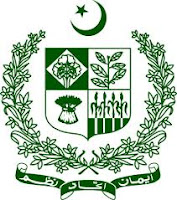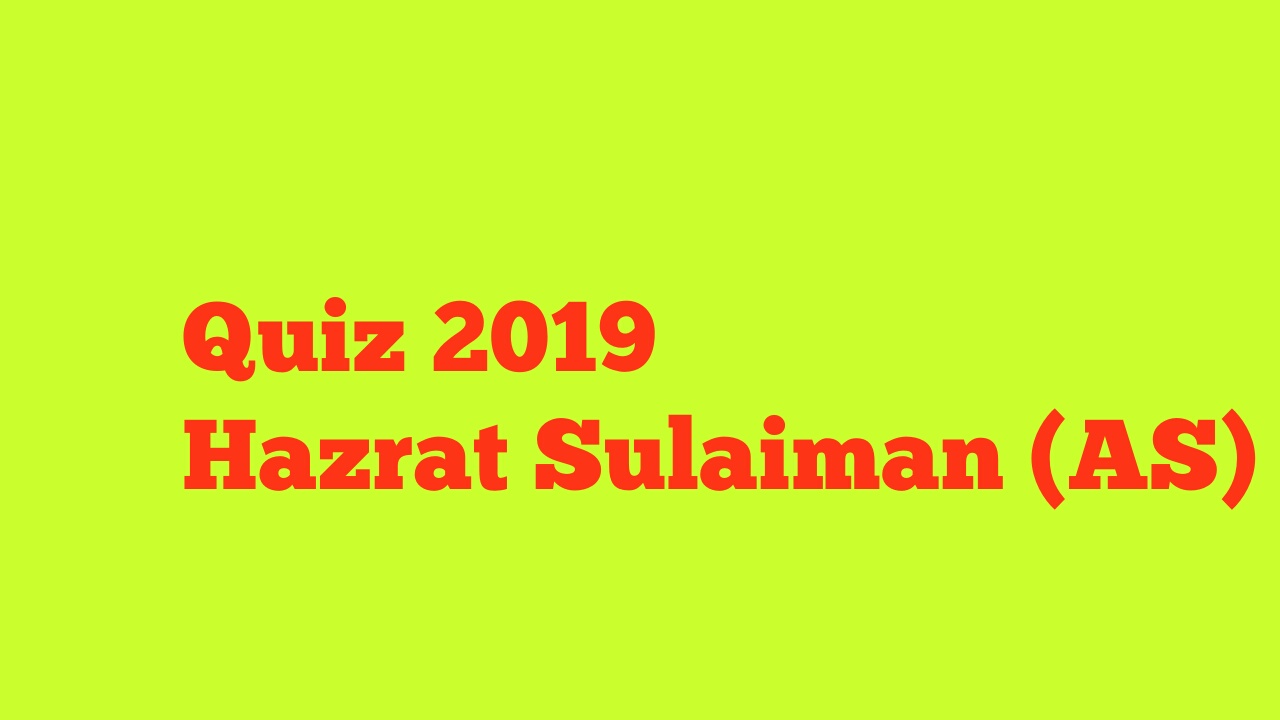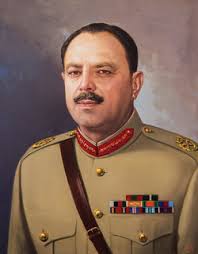Answers of Quiz 1708 (Government of Pakistan)
1. Parliamentary Form
2. Islamic Republic of Pakistan
3. Legislative, Executive & Judiciary
4. Legislative
5. An apex Supreme Court, high courts of four provinces, district, anti-terrorism, Sharia, & the green courts; all inferior to the Supreme Court.
6. Exit Control List, Pakistan Penal Code & Frontier Crimes Regulations
7. Article 246th & Article 247th
8. President of Pakistan
9. Prime Minister of Pakistan
10. Chief Minister
11. Because the seat of government is in Islamabad
12. President of Pakistan is elected for a five-year term by an indirect election, the electoral college consisting of members of the Senate, National Assembly & the four provincial assemblies.
13. (B) President
14. (C) Ceremonial figurehead
15. (D) Chief Executive
16. The separation of powers, often imprecisely & metonymically used interchangeably with the trias politica principle, is a model for the governance of a state (or who controls the state). Under this model, the state is divided into branches, each with separate & independent powers & areas of responsibility so that the powers of one branch are not in conflict with the powers associated with the other branches. The typical division is into three branches: a legislature, an executive, & a judiciary, which is the trias politica model. It can be contrasted with the fusion of powers in some parliamentary systems where the executive & legislature (& sometimes parts of the judiciary) are unified. Separation of powers, therefore, refers to the division of responsibilities into distinct branches to limit any one branch from exercising the core functions of another. The intent is to prevent the concentration of power & provide for checks & balances.
17. 4 times (In 1958, 1969, 1877 & 1999)
18. Caretaker governments may be put in place when a government in a parliamentary system is defeated in a motion of no confidence, or in the case when the house to which the government is responsible is dissolved, to be in place for an interim period until an election is held & a new government is formed.
19. A coalition government is a cabinet of a parliamentary government in which multiple political parties cooperate, reducing the dominance of any one party within that coalition. The usual reason for this arrangement is that no party on its own can achieve a majority in the parliament.
20. Exit Control List (ECL) s a system of border control maintained by the Government of Pakistan under the Exit from Pakistan (Control) Ordinance. Those persons on the list are prohibited from leaving Pakistan.
21. Pakistan Penal Code (PPC) is a penal code for all offences charged in Pakistan.
22. Election Commission of Pakistan (ECP) is an independent, autonomous, permanent & constitutionally established federal body, responsible for organizing & conducting of elections to state parliament, provisional legislatures, local governments, elections to the office of President of Pakistan, Delimitation of Constituencies & preparation of Electoral Rolls.
23. Vote of no confidence is a statement or vote that a person or persons in a position of responsibility (government, managerial, etc) is no longer deemed fit to hold that position: perhaps because they are inadequate in some respect, are failing to carry out obligations or are making decisions that other members feel are detrimental.
24. Federal Public Service Commission (FPSC) is a federal agency of Government of Pakistan that is responsible recruiting civil servants & bureaucrats in Government of Pakistan.
25. Central Superior Service (CSS or Bureaucracy) is an elite permanent bureaucratic authority, & the civil service that is responsible for running the civilian bureaucratic operations & government secretariats & directorates of the Cabinet of Pakistan. The civil service defined itself as "key wheels on which the entire engine of the state has to move". The civil service exams are competitive & provides equal opportunities to males & females, depending on their qualifications. The CSS Exams are held at the start of every year. The exams are conducted & supervised by the Federal Public Service Commission (FPSC). CSS is the biggest competitive exam of Pakistan.
26. Pakistan Administrative Service (PAS) previously known as the District Management Group (DMG) is an elite cadre of the Civil Service of Pakistan. Officers in this group are recruited through a competitive exam held once a year by the FPSC. Those selected for this group have to undergo a two-year training programme at the Civil Services Academy (CSA) in Lahore.
27. Civil Society Civil Society is the "aggregate of NGOs & institutions that manifest interests & will of citizens". It includes the family & private sphere, referred to as the "third sector" of society, distinct from government & business.
28. Council of Islamic Ideology (CII) is a constitutional body responsible for giving legal advice on Islamic issues to the government & the Parliament.
29. National Finance Commission (NFC) Award is a series of planned economic program enacted since 1951. Constituted under the Article 160 of the Constitution, the program was emerged to take control of financial imbalances & equally managed the financial resources to four provinces to meet their expenditure liabilities while alleviating the horizontal fiscal imbalances. As per Constitution, the program awards the designs of financial formulas of economic distribution to provincial & federal government for five consecutive years. All together, a total of seven awards has been reimbursed since its emergence in 1951, by Prime Minister Liaquat Ali Khan.
30. Council of Common Interests (CCI) is a constitutional body which resolves the disputes of power sharing between the federation & provinces.
31. National Accountability Bureau (NAB) is an autonomous & constitutionally established federal institution responsible to build efforts against corruption & prepare critical national economic intelligence assessments against economic terrorism to the Government of Pakistan.
32. National Disaster Management Authority (NDMA) is an autonomous & constitutionally established federal authority mandated to deal with whole spectrum of disastes & their management in the country.
33. Federal Board of Revenue (FBR) is a semi-autonomous federal agency that is responsible for enforcing fiscal laws & collecting revenue for the Government of Pakistan.
34. Higher Education Commission (HEC) is an independent, autonomous & constitutionally established institution of primary funding, overseeing, regulating & accrediting the higher education efforts in Pakistan.
35. Supreme Court of Pakistan (SCOP) is the apex court in the judicial hierarchy of Pakistan, the final arbiter of legal & constitutional disputes.
2. Islamic Republic of Pakistan
3. Legislative, Executive & Judiciary
4. Legislative
5. An apex Supreme Court, high courts of four provinces, district, anti-terrorism, Sharia, & the green courts; all inferior to the Supreme Court.
6. Exit Control List, Pakistan Penal Code & Frontier Crimes Regulations
7. Article 246th & Article 247th
8. President of Pakistan
9. Prime Minister of Pakistan
10. Chief Minister
11. Because the seat of government is in Islamabad
12. President of Pakistan is elected for a five-year term by an indirect election, the electoral college consisting of members of the Senate, National Assembly & the four provincial assemblies.
13. (B) President
14. (C) Ceremonial figurehead
15. (D) Chief Executive
16. The separation of powers, often imprecisely & metonymically used interchangeably with the trias politica principle, is a model for the governance of a state (or who controls the state). Under this model, the state is divided into branches, each with separate & independent powers & areas of responsibility so that the powers of one branch are not in conflict with the powers associated with the other branches. The typical division is into three branches: a legislature, an executive, & a judiciary, which is the trias politica model. It can be contrasted with the fusion of powers in some parliamentary systems where the executive & legislature (& sometimes parts of the judiciary) are unified. Separation of powers, therefore, refers to the division of responsibilities into distinct branches to limit any one branch from exercising the core functions of another. The intent is to prevent the concentration of power & provide for checks & balances.
17. 4 times (In 1958, 1969, 1877 & 1999)
18. Caretaker governments may be put in place when a government in a parliamentary system is defeated in a motion of no confidence, or in the case when the house to which the government is responsible is dissolved, to be in place for an interim period until an election is held & a new government is formed.
19. A coalition government is a cabinet of a parliamentary government in which multiple political parties cooperate, reducing the dominance of any one party within that coalition. The usual reason for this arrangement is that no party on its own can achieve a majority in the parliament.
20. Exit Control List (ECL) s a system of border control maintained by the Government of Pakistan under the Exit from Pakistan (Control) Ordinance. Those persons on the list are prohibited from leaving Pakistan.
21. Pakistan Penal Code (PPC) is a penal code for all offences charged in Pakistan.
22. Election Commission of Pakistan (ECP) is an independent, autonomous, permanent & constitutionally established federal body, responsible for organizing & conducting of elections to state parliament, provisional legislatures, local governments, elections to the office of President of Pakistan, Delimitation of Constituencies & preparation of Electoral Rolls.
23. Vote of no confidence is a statement or vote that a person or persons in a position of responsibility (government, managerial, etc) is no longer deemed fit to hold that position: perhaps because they are inadequate in some respect, are failing to carry out obligations or are making decisions that other members feel are detrimental.
24. Federal Public Service Commission (FPSC) is a federal agency of Government of Pakistan that is responsible recruiting civil servants & bureaucrats in Government of Pakistan.
25. Central Superior Service (CSS or Bureaucracy) is an elite permanent bureaucratic authority, & the civil service that is responsible for running the civilian bureaucratic operations & government secretariats & directorates of the Cabinet of Pakistan. The civil service defined itself as "key wheels on which the entire engine of the state has to move". The civil service exams are competitive & provides equal opportunities to males & females, depending on their qualifications. The CSS Exams are held at the start of every year. The exams are conducted & supervised by the Federal Public Service Commission (FPSC). CSS is the biggest competitive exam of Pakistan.
26. Pakistan Administrative Service (PAS) previously known as the District Management Group (DMG) is an elite cadre of the Civil Service of Pakistan. Officers in this group are recruited through a competitive exam held once a year by the FPSC. Those selected for this group have to undergo a two-year training programme at the Civil Services Academy (CSA) in Lahore.
27. Civil Society Civil Society is the "aggregate of NGOs & institutions that manifest interests & will of citizens". It includes the family & private sphere, referred to as the "third sector" of society, distinct from government & business.
28. Council of Islamic Ideology (CII) is a constitutional body responsible for giving legal advice on Islamic issues to the government & the Parliament.
29. National Finance Commission (NFC) Award is a series of planned economic program enacted since 1951. Constituted under the Article 160 of the Constitution, the program was emerged to take control of financial imbalances & equally managed the financial resources to four provinces to meet their expenditure liabilities while alleviating the horizontal fiscal imbalances. As per Constitution, the program awards the designs of financial formulas of economic distribution to provincial & federal government for five consecutive years. All together, a total of seven awards has been reimbursed since its emergence in 1951, by Prime Minister Liaquat Ali Khan.
30. Council of Common Interests (CCI) is a constitutional body which resolves the disputes of power sharing between the federation & provinces.
31. National Accountability Bureau (NAB) is an autonomous & constitutionally established federal institution responsible to build efforts against corruption & prepare critical national economic intelligence assessments against economic terrorism to the Government of Pakistan.
32. National Disaster Management Authority (NDMA) is an autonomous & constitutionally established federal authority mandated to deal with whole spectrum of disastes & their management in the country.
33. Federal Board of Revenue (FBR) is a semi-autonomous federal agency that is responsible for enforcing fiscal laws & collecting revenue for the Government of Pakistan.
34. Higher Education Commission (HEC) is an independent, autonomous & constitutionally established institution of primary funding, overseeing, regulating & accrediting the higher education efforts in Pakistan.
35. Supreme Court of Pakistan (SCOP) is the apex court in the judicial hierarchy of Pakistan, the final arbiter of legal & constitutional disputes.



Comments
Post a Comment